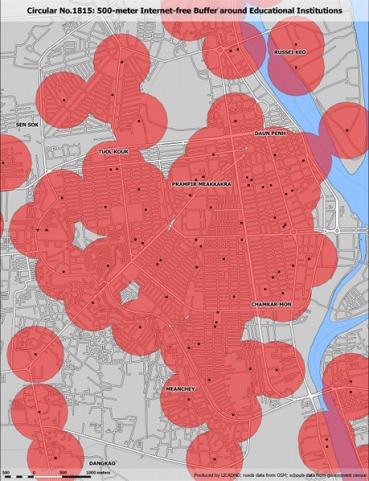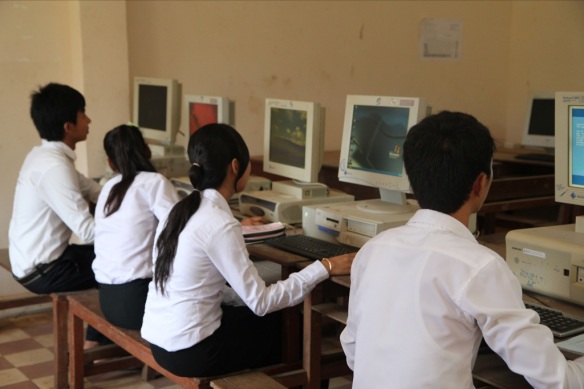Want to visit an Internet cafe in downtown Phnom Penh? If the government has its way, that might not be an option for too much longer.
New circular 1815 has been put out by the Cambodian government that states that Internet cafes shouldn’t be allowed to operate within 500 meters of schools or educational institutions. Further, people under 18 won’t be allowed to use Internet cafes either, and no one will be allowed to play “all kinds of games.” Why?
Because Cambodians are apparently engaging in terrorism, economic crimes, and even looking at pornography with the benefit of the Internet. (And here I thought they were all just playing Facebook). You can read the circular in Khmer here.
OK. These directives sound simple enough, if rather insulting—until you take into account just how many schools there really are here in Phnom Penh.

Human rights NGO LICADHO is on the case—and they’ve produced a rather damning map of Cambodian schools, with the requisite 500 meter No Internet Zone drawn around them. As you can see, that leaves essentially no room for Internet cafes to operate, and spells big trouble for the many already extant within the red-zones. Problem.
What would happen if an Internet cafe is caught within the red zone, or if a “crime” is committed on the premises? The circular, according to LICADHO, says the shop would be closed, all the equipment would be confiscated, and owners would face arrest. No big.
Furthermore, average Cambodian Internet users would suddenly find themselves with very limited access to information—likely the intended result of the circular.
“There is nowhere for the Internet cafes to go,” said Urban Voice Cambodia team member Nora Lindström at a mapping meeting last night of the new circular.
“That means only people who have personal computers can access the Internet, while people who are using Internet cafes will not be able to access the internet. This is a issue of freedom of expression, and freedom to access information.”
I’ve got to wonder how exactly this directive might apply to hotels and cafes that provide free computers for customers to use, although they’re not primarily “Internet cafes” as such. I have a rather sneaking suspicion that lucrative businesses that cater primarily to Internet-addicted foreigners would probably be able to get away with an exemption—or at least some healthy bribes.
Sure, it’s unclear exactly how much power a “circular” actually has to effect change here in Cambodia, or if this is likely to ever become law. But the fact it’s floating around at all is a disturbing indication that the Cambodian government is looking into restricting its relatively free Internet, following the deeply dubious lead of China, an influential friend to the Hun Sen regime.
Furthermore, they’re doing it in a way that’s downright condescending. Did they really think the pro-Internet freedom lobby would fail to notice and condemn this immediately?
Finally: even if this measure never becomes law, it’s enough of a Sword of Damocles over the heads of Internet cafe owners. It could easily be used as a rationale for unscrupulous sorts in the government to collect hefty bribes from owners if they want to continue operating. As we well know, that could get ugly.
How can we fight back?
At a mapping meeting last night in Phnom Penh, social-mapping group Urban Voice Cambodia offered one interesting solution: crowd-sourcing the locations of all the Internet cafes in Phnom Penh.
No one knows exactly where these cafes are in relation to schools, and putting them down on paper could help alert the owners whose businesses are at risk of closure, or at least serious extortion.
Furthermore, this action would indicate to the government that Internet freedom supporters are absolutely paying attention—and a supposedly “sneaky” circular like the Internet Cafe rule is by no means going to go unnoticed.
“We want to crowd-source the location of all the Internet cafes in PP, because whether or not the government decides to implement this decree—which seems unimplementable—it does allow them threaten and intimidate owners of internet cafes to pay bribes to continue operating,” said Nora Lindström.
So if you’ve got any time this week and are an advocate of the free Internet in Cambodia, head to Urban Voice Cambodia and document your friendly neighborhood Internet cafe. You can submit a report here, and it’s a very easy process. Every little bit helps.
More insight from KhmerBird, VOA, and the Cambodia Daily at these links.
Licadho’s report on the circular here.


It’s a shame I missed the mapping meetup last night, this would have been an interesting discussion! I knew Mathew had been working on this, but had order from the boss to be home for dinner.
For me, I think there’s more being made of this story than need be. Firstly almost every prakas issued by the Phnom Penh municipality is universally ignored within about a month of being issued or at least worked around in some way. BBQ cows, tuk-tuks, petrol stations open after midnight, outside seating on the riverside, no sidewalk parking on 130, hair colors, short skirts, KTV, snooker halls, the list is literally endless.
IMHO the usual suspects making lots of noise about it will almost guarantee that it won’t be forgotten about like the others. I often wonder whether some groups care more about the end result or scoring points and building a narrative? The best way to make this go away, is to do it the Khmer way and everyone just play it lip service for a few weeks, then ignore it, then it will go away once the municipality has moved onto the next “pressing” issue. Ignoring it will be impossible if curtain groups want to make a big story out of it.
Being completely anti-censorship, I don’t agree with the policy, but I understand it. The way Cambodians access the interenet has changed hugely in the last year or two. WIFI is now literally everywhere, petrol stations, beer gardens, mini-marts, burger joints. Now mobile internet has dropped below the $5 per month mark it’s affordable to the same group that can afford internet cafes.
The internet cafes that used to be on every other street are now a dying breed and the ones that still do exist are being forced into smaller niches, that niche seems to be kids and privacy and I’m pretty sure it’s not for privacy from being seen reading KI-Media. Just walk into any non-tourist internet cafe and look at the browser history. I will bet an evening of beers that gaming/porn/gambling websites outnumber politically sensitive website by a factor of 100 to 1, if not more.
I think as foreigners we often tend to read to much into these things and forget that maybe truancy, gambling and access to porn are issues for local voters. I know my Khmer nephew is banned from going to internet cafes, I haven’t asked for the details, but I’m pretty sure that it wasn’t for friending Mu Sochua on Facebook.
Pingback: Cambodia Bans Internet Cafes Near Schools · Global Voices
Pingback: Cambodia Bans Internet Cafes Near Schools. | Conexión 58
I’m not sure it’s as nefarious as it sounds. I remember when the Cambo Six gambling houses were closed. I personally welcomed that. Be that as it may, at the same time, they did a brief crackdown on card playing in the little shops in villages. The intent of the law was to discourage gambling, which was a big problem. In my area, at least, they’ve backed off on that and only use the law when things get out of hand. People playing for small money in small groups are pretty much left alone.
Internet cafés near schools can be a problem, because a lot of kids are tempted to go to the cafes instead of school. 99 out of 100 of them do just play games and network on Facebook – at least at my nearby internet café they do. Café owners know this and sometimes deliberately set up near schools. We’ll have to wait and see, but I suspect the law will be used as a warning to proprietors not to encourage kids to cut school to go to internet cafes.
It seems to me that expats see something suspicious in everything the Cambodian government does and jump to conclusions. I think a little reality check on our own cultural conditioning and ethnocentrism is in order if we choose to live in Cambodia.
Pingback: Cambogia: Internet Cafè vietati nei pressi delle scuole | Closer Dynamics - Siti Web Roma Web Agency - Mobile apps - Web & Social Media Marketing
Pingback: Kambodzsa bezáratja az iskolák közelében működő internetkávézókat · Global Voices Magyarul
Pingback: Cambodia Bans Internet Cafes Near Schools | Blue lady blog (ប្លុករបស់ប្លូឡេឌី)
Pingback: Global Voices | 柬埔寨:学校附近禁设网咖 - 中国数字时代
Pingback: U Kambodži Propisana Zabrana Postojanja Internet Kafea Pored Škola · Global Voices na srpskom
Pingback: ប្រទេសកម្ពុជាបម្រាមមិនអោយបើកហាងអ៊ីនធើណែតដែលមានទីតំាងជិតសាលារៀន · Global Voices ជាភាសាខ្មែរ
Pingback: Cambodia's "War" on Internet Cafes
Pingback: Cambodia’s “War” On Internet Cafes | AhipCup
Pingback: Cambodia’s “War” On Internet Cafes | Protect My Internet Cafe
Pingback: Cambodge: Les cybercafés interdits aux abords des écoles
Pingback: WiFi Horizon, Best news updates, offers and business opportunities